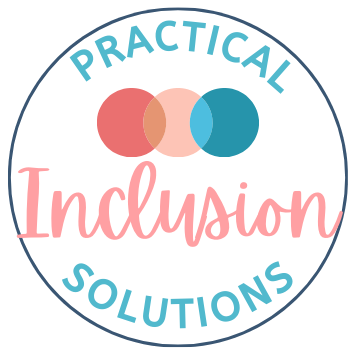Let’s be honest: teaching in today’s world is challenging. And when it comes to special education, those challenges can sometimes feel even more daunting. Educators face a myriad of challenges daily: implementing new curriculum mandates, managing diverse and sometimes difficult behaviors, navigating demanding parental expectations, and struggling with limited support and staffing. Add to that the crucial responsibility of providing meaningful inclusion opportunities for students with disabilities, and the job can seem nearly impossible. That’s where special education consultation comes in.
As the saying goes, “You can’t fill others’ buckets if your bucket is empty.” This is where the power of teamwork, collaboration, and consultation comes in. By working together, educators can share the load and better support one another and the students they serve.
Effective collaboration in special education is more than just a strategy—it’s a lifeline. It ensures that students with disabilities not only receive a meaningful education but do so in an inclusive environment that supports their academic, social, and emotional growth. Yet, despite its importance, successful collaboration can be challenging. Conflicting schedules, differing communication styles, and varied perspectives are just a few hurdles teams must overcome for special education consultation.
Just as we have shared tips and tricks to increase practical inclusion opportunities such as with flexible seating or assistive technology, we now want to focus on utilizing the support of others on your team. In this post, we’ll explore why collaboration is essential in special education and share some practical tips to make teamwork more efficient and effective.
Why is Special Education Collaboration Important?
Comprehensive Understanding of Student Needs
No single educator or specialist can fully capture the range of a student’s needs, strengths, and challenges. Through collaboration, teachers, therapists, counselors, and families can pool their knowledge to provide a holistic view of each student. This leads to more personalized, effective Individualized Education Plans (IEPs) that support every aspect of a student’s learning, development, and well-being.
Sharing Expertise
Special education consultation allows professionals to tap into each other’s strengths. Special education teachers excel in modifying instruction for diverse needs, while general education teachers are curriculum experts. Speech-Language Pathologists (SLPs) understand communication challenges, Board Certified Behavior Analysts (BCBAs) offer support with behavioral challenges, and Occupational and Physical Therapists (OTs and PTs) offer insights into sensory needs and physical abilities. By blending these perspectives, the team can develop a well-rounded plan tailored to the student’s unique requirements.
Consistent Support Across Environments
Consistency is key for students with special needs. Special education collaboration ensures that everyone—from teachers to paraprofessionals to parents—is on the same page, using the same strategies, language, and approaches. This unified front creates stability for students and helps reinforce learning and positive behavior both in and out of the classroom.
Engaging Families in the Process
Families know their children best, and when they are involved in decision-making and planning, it strengthens the support network for students. Special education consultation and collaboration with families can help manage expectations, build trust, and align school and home efforts. Plus, it makes IEP meetings smoother, as everyone is already working from a shared understanding.
Tips for Effective Special Education Collaboration
- Use Digital Tools for Efficient Communication – Create a shared Google Doc with an agenda for each consultation or team meeting. This keeps everyone on track, provides a written record of decisions, and helps team members who miss a meeting stay informed.
- Set an Agenda – At school, there are never enough hours in a day to do everything. It’s easy to get sidetracked during consults and lose precious minutes. Using digital tools such as a Google Doc can allow service providers to add questions that come up during the week or agenda items to discuss. This can also help keep the consult on track so that time is being used efficiently.
- Focus on Student Strengths– It’s easy to get bogged down by the challenges, but focusing on a student’s strengths can inspire new strategies for inclusion. Build from what the student does well and explore how to leverage their abilities to overcome obstacles.
- Tap Into Each Other’s Expertise
- Recess struggles? Collaborate with the PT to make recess more physically accessible and enjoyable for the student. Collaborate with the SLP to look at social opportunities that can help the student access games with peers.
- Difficulty staying seated? Check in with the OT for sensory tools like chair bands, Velcro strips, or fidgets that can help.
- Writing challenges? Work with the OT on the mechanics of writing and the SLP on the language and executive function aspects like organizing and sequencing.
- Practice Flexibility – No one has all the answers. Be open to suggestions from your team members—whether it’s a therapist, a paraprofessional, or a parent. As educators, we’re always learning and improving. Practicing flexibility not only benefits students but also strengthens the collaborative spirit.
- Celebrate Successes Together– Collaboration isn’t just about solving problems—it’s about celebrating wins, too. Acknowledge even the small victories, whether it’s a student mastering a new skill or a breakthrough in communication. Celebrating progress boosts morale and reminds everyone of the impact they’re making.
Special Education Consultation- The Bottom Line
Special education consultation is at the heart of inclusive special education programs. By tapping into the collective expertise of educators, specialists, and families, we can build a learning environment that empowers students with disabilities to thrive. Together, we can break down barriers and create a school culture that celebrates every student’s unique contributions. Special education collaboration helps us to work smarter, not harder!
Interested in more information and tips about special education consultation? Check out these articles:
💡How Collaboration Fosters Effective Inclusion for Special Education Students
💡 Strategies for Effective Collaboration in Special Education
💡Strategies for Effective Collaboration between General and Special Education Teachers
